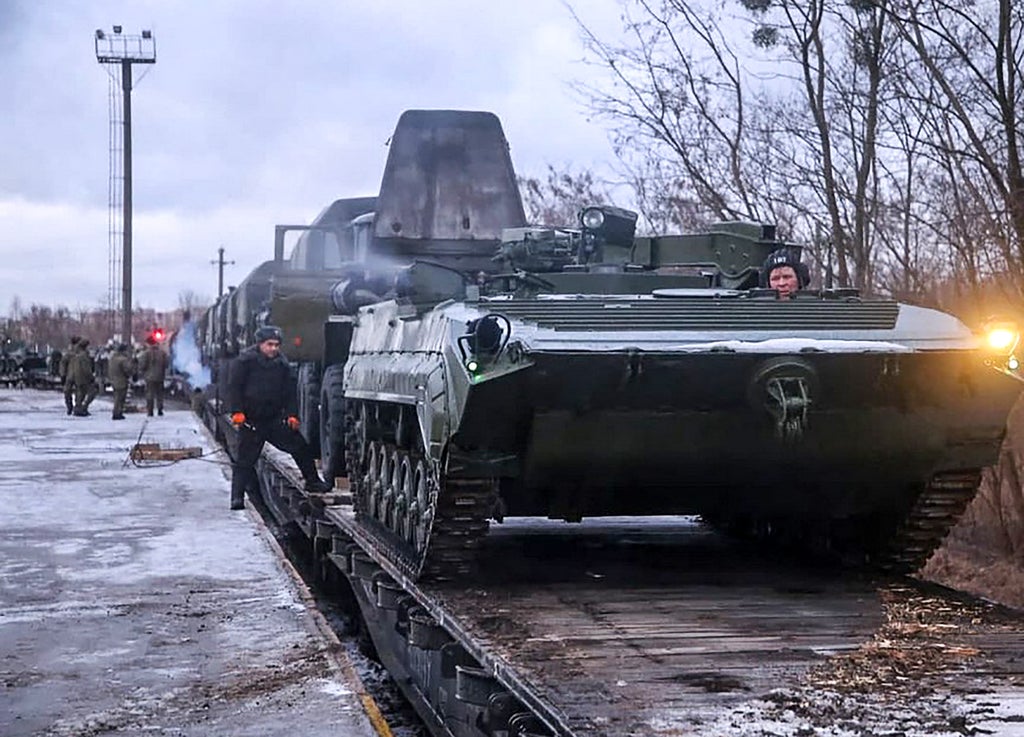
As the intense military standoff along Russia’s border with Ukraine continues, frantic diplomatic efforts by the Western powers to discourage Vladimir Putin from launching an invasion are likewise ongoing.
In the latest developments, UK armed forces minister James Heappey has warned that Europe is closer to war than the continent has been for 70 years as the US estimates that the total number of Russian forces at the border now stands closer to 130,000.
German chancellor Olaf Scholz is due to meet with Ukrainian president Volodymyr Zelensky and with Mr Putin this week in the hope of forging a breakthrough in the quest for peace.
Last week, UK foreign secretary Liz Truss flew out to Moscow to meet with her Kremlin counterpart, Sergei Lavrov, with the aiming of persuading the Russians to drop the “Cold War rhetoric” and caution that a bloody conflict would prove “disastrous” for both sides.
British prime minister Boris Johnson meanwhile visited Poland after placing an additional 1,000 British soldiers on standby to be posted to the country in the interest of bolstering Nato’s presence in Eastern Europe should a war erupt, with Russian forces on manoeuvres in Belarus and its warships circling in the Black Sea.
Earlier, US president Joe Biden and Mr Scholz met in Washington, DC, to discuss the crisis and threatened to block the Nord Stream 2 natural gas pipeline if Mr Putin escalated the situation while French president Emmanuel Macron met with the Russian leader and cited the Minsk agreements as the “only path on which peace can be built”.
He was referring to a pair of accords signed in the Belarussian capital in 2014 and 2015 in the hope of ending violence in the region.
At that time, Mr Putin had annexed the Crimean Peninsula and supported a pro-Russian separatist insurgency in the eastern Donbas region of the Ukraine in the wake of his ally Viktor Yanukovych‘s ousting as president.
The initial agreement, known as Minsk I, was signed five months into the conflict on 5 September 2014 by representatives of Ukraine, Russia, the Organisation for Security and Cooperation in Europe (OSCE) and by the Russian-backed separatist leaders Alexander Zakharchenko and Igor Plotnitsky and set out a 12-point ceasefire deal.
Its provisions included prisoner exchanges, the delivery of humanitarian aid and the withdrawal of heavy weapons but subsequently broke down following violations by both sides.
The following February, the signatories were reconvened to sign a successor agreement, dubbed Minsk II, that had been thrashed out at a summit held at the city’s Independence Palace mediated by French president Francois Hollande and German chancellor Angela Merkel and attended by Mr Putin and Ukrainian president Petro Poroshenko.
Minsk II, signed on 12 February 2015, required the participants to adhere to the following 13 points:
- An immediate and comprehensive ceasefire.
- Withdrawal of all heavy weapons by both sides.
- Monitoring and verification by the OSCE.
- To start a dialogue on interim self-government for the Donetsk and Luhansk regions, in accordance with Ukrainian law, and acknowledge their special status by a resolution of parliament.
- A pardon and amnesty for people involved in the fighting.
- An exchange of hostages and prisoners.
- Provision of humanitarian assistance.
- Resumption of socio-economic ties, including pensions.
- Restore full control of the state border by the government of Ukraine.
- Withdrawal of all foreign armed formations, military equipment and mercenaries.
- Constitutional reform in Ukraine including decentralisation, with specific mention of Donetsk and Luhansk.
- Elections in Donetsk and Luhansk on terms to be agreed with their representatives.
- Intensify the work of a Trilateral Contact Group including representatives of Russia, Ukraine and the OSCE.
However, its conditions were not adhered to either, with Russia insisting that it is not a party to the conflict and that the agreement therefore does not apply, arguing that it cannot remove armed forces and military hardware from Donetsk and Luhansk given that the combatants are part of the separatist insurgency and are not its own.
The two sides remain at odds over the purpose of Minsk II, according to Al Jazeera, with Ukraine viewing it as a means by which it can re-establish control over its border, whereas Russia sees it as a chance to grant autonomy to the rebel territories, effectively giving the Kremlin a voice in Ukrainian foreign policy by proxy.
The prospect of elections in Donbas are also controversial given that they raise the possibility of former separatist warlords sitting in parliament or winning high office within the police, an intolerable outcome to many Ukrainians.
“The key political provisions are incompatible, in my opinion, with Ukraine’s existence as a sovereign country,” Duncan Allan, a fellow at Chatham House who specialises in the Minsk agreements, told Open Democracy, arguing that they present a “very convoluted and confused sequencing procedure”.
Mr Macron is keen to play peacemaker, not least because he faces a fight for his own re-election this April, and hopes to be able to convince his inscrutable Russian counterpart to abandon his ambitions for Ukraine and hostility to Nato and accept the terms of Minsk II.
Envoys of the original signatories met in Berlin to discuss the deal on 10 February while the United Nations Security Council will debate it again this Wednesday but whether Mr Putin shares the Frenchman’s breezy confidence that tensions that have claimed 14,000 lives in eight years can be brought to a close remains to be seen.
Additional reporting by agencies







